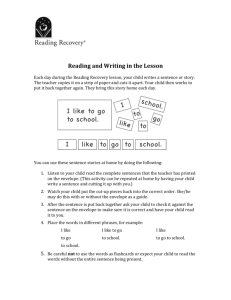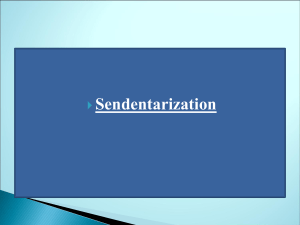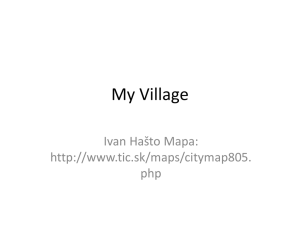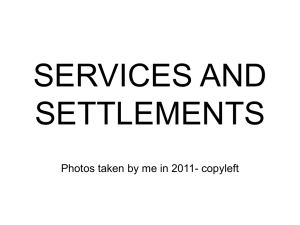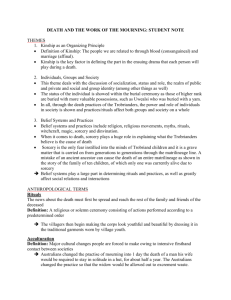7.4 - Village Society in West Africa
advertisement
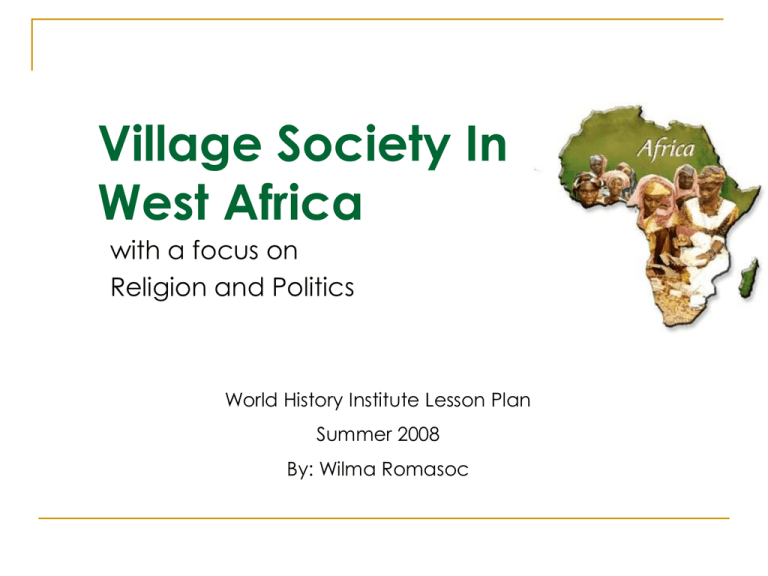
Village Society In West Africa with a focus on Religion and Politics World History Institute Lesson Plan Summer 2008 By: Wilma Romasoc Requirements: California content standard addressed 7.4 Students analyze the geographic, political, economic, religious, and social structure of the sub-Saharan civilizations of Ghana and Mali in Medieval Africa - Analyze the importance of family, labor specialization and regional commerce in the development of states and cities in West Africa. (through vocabulary study.) Historical and Social Science Analysis Skills -Students understand and distinguish relevant from irrelevant information, essential from incidental information, and verifiable from unverifiable information in historical narratives and stories. General Objective: Identify and describe what aspects of religion affected West African Society and how kinship affected the village government. Student Objectives: By the end of this lesson: You will define vocabulary terms in small groups. You will sort words into categories. You will identify and explain the influences religion had on Western African village life. You will describe the role of Kinship and its effects on village government in Western Africa. You will write two paragraphs answering the essential questions. You will write a thesis statement at the end of the lesson Lesson Plan Details Estimated length of lesson: 90 minutes or 2 45-minute periods Materials: Houghton Mifflin “Across the Centuries” Textbook (Chapter 5, Lesson 4, pg 125-127) copy provided Folder that contains 2 separate envelopes for each set of vocabulary (envelope 1=vocabulary words and envelope 2= additional vocabulary words) Dictionary and Textbook Glossary Directions: 1. Hand out vocabulary worksheet 2. Divide class into small groups of 4 3. Hand out the folder; have one member of the group open envelope #1 containing the first set of vocabulary words 4. Have each member define terms in its historical context 5. Sort words into categories and justify these categories 6. Repeat steps 3-5 using the envelope labeled #2 7. As a class, provide definitions and list other word forms (i.e inherit, inheritance) 8. Read text containing vocabulary pg 125-127 9. Have the students read the two essential questions 10. Have the students use all vocabulary terms from envelopes #1 and #2 to answer these questions 11. Have students present their responses as teacher writes them on the board 12. Have each student write a thesis statement focused on the effect of family ties on religious and political views in the West African Village Society Envelope #1 Vocabulary List Diviner Ancestor worship Kinship Interact Rituals Drought Disaster Clan Matrilineal Bilateral System Nuclear Family Extended Family Social Pressure Envelope #2 Vocabulary List Divinity Inherit Respect Villager’s Survival Influence Masks Spirits Determines position Ancestors Music Dancing Curb bad behavior As a result of In response to Essential Questions Directions: Use the words in envelopes #1 & #2 to write 2 paragraphs answering the following essential questions: 1)How did kinship affect the village government in West Africa? 2) What aspects of religion influenced the village society of West Africa? Assessment Write a sentence for each of the following vocabulary words related to the context of the chapter. 1. Kinship 2. Diviner 3. Ancestor Worship 4. Clan 5. Matrilineal 6. Social Pressure 7. Bilateral System 8. Nuclear Family 9. Extended Family 10. Rituals Other forms of assessment Teacher observation of student’s participation and responses Performance assessment-have students create sketches of 5 vocabulary words and write a caption explaining the meaning of the words

